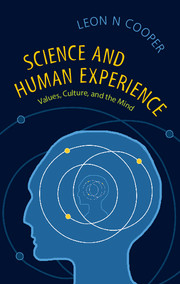Book contents
- Frontmatter
- Dedication
- Contents
- Preface
- Acknowledgement
- Part One Science and Society
- Part Two Thought and Consciousness
- Part Three On the Nature and Limits of Science
- 19 What Is a Good Theory?
- 20 Shall We Deconstruct Science?
- 21 Visible and Invisible in Physical Theory
- 22 Experience and Order
- 23 The Language of Physics: On the Role of Mathematics in Science
- 24 The Structure of Space
- 25 Superconductivity and Other Insoluble Problems
- References
22 - Experience and Order
from Part Three - On the Nature and Limits of Science
Published online by Cambridge University Press: 05 November 2014
- Frontmatter
- Dedication
- Contents
- Preface
- Acknowledgement
- Part One Science and Society
- Part Two Thought and Consciousness
- Part Three On the Nature and Limits of Science
- 19 What Is a Good Theory?
- 20 Shall We Deconstruct Science?
- 21 Visible and Invisible in Physical Theory
- 22 Experience and Order
- 23 The Language of Physics: On the Role of Mathematics in Science
- 24 The Structure of Space
- 25 Superconductivity and Other Insoluble Problems
- References
Summary
Where does order come from? Is it there in nature to be discovered, or do we invent it? Do we discover the laws of nature or do we create them? Is there a difference between these two viewpoints?
This essay is based on a chapter originally published in An Introduction to the Structure and Meaning of Physics in 1968.
Man comes into the world with a cry: a burst of light, a slap, initiate him into the universe of sensation. The material of science is this: our experience of the natural world, the world that is – not the ones that might be. Somehow in the mind this raw experience is ordered, and this order is the substance of science. What happens there is the application to a great diversity of the phenomena of the world of many of those elements called common sense, used every day and resting on certain suppositions we make concerning the world about us. Some of these are probably universal to man and beast. Others are more particular. We tend to accept them without special awareness, and some are so well hidden we are scarcely conscious of their existence.
The foremost supposition is the belief that the world outside ourselves, outside our own mind, exists. This belief is so primitive that it is very likely shared by all, except animals lowest on the evolutionary scale and some philosophers (whose position on the evolutionary scale we cannot guess).
- Type
- Chapter
- Information
- Science and Human ExperienceValues, Culture, and the Mind, pp. 177 - 187Publisher: Cambridge University PressPrint publication year: 2014

